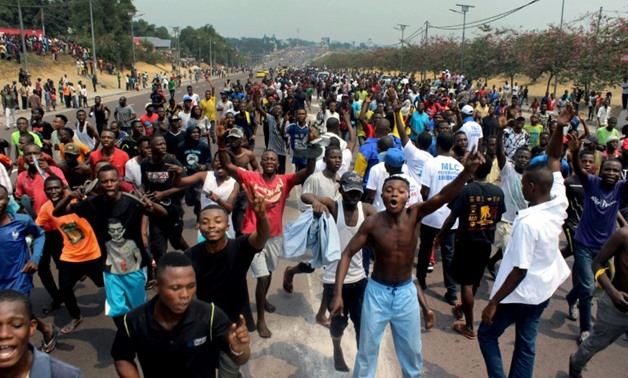
Supporters of The Movement for the Liberation of Congo (MLC) welcomed former DR Congo warlord Jean-Pierre Bemba after he arrived in Kinshasa
2 August 2018: After more than 11 years abroad -- a decade of it behind bars -- former DR Congo warlord Jean-Pierre Bemba made a triumphant return home on Wednesday in front of tens of thousands supporters and police firing teargas, reflecting the country's high-voltage political mood.
Bemba, throwing down the gauntlet to his rival President Joseph Kabila, has vowed to contest twice-delayed elections due to take place on December 23.
He landed at Kinshasa from Belgium aboard a private plane after the International Criminal Court (ICC) acquitted him of war-crimes charges in June.
"Bemba is the leader of the Congo, he knows exactly what to do for his Congolese brothers," said Jean-Bertrand Ngondo, among cheering supporters at the capital's Ndjili airport.
Crowds of people, many of them chanting anti-Kabila slogans, also gathered along the city's main highway, prompting police to fire teargas to try to make a path for his open-topped Mercedes, an AFP reporter saw.
The huge numbers greeting Bemba, 55, is the largest politically-related gathering in Democratic Republic of Congo in two years, after a crackdown on protests by Kabila since 2016.
"With the return of Bemba, it is time for Kabila to go. He has made us suffer a lot," said Mado, a vegetable seller.
Police had to cordon off a major avenue that leads directly to Kabila's presidential palace, where two of Bemba's properties are also situated nearby, which led to a temporary standoff.
"I have received clear and precise instructions: Senator Bemba cannot cross this barrier," said Kinshasa police chief Sylvano Kasongo.
But after negotiations, Bemba was allowed to pass the police cordon and travel to a different family property further from the presidential palace.
Analysts say Bemba's return introduces even more uncertainty into an already volatile election. Candidates must submit their applications by August 8 and physically be in the country to do so.
The DRC has never known a peaceful transition of power since it gained independence from Belgium in 1960 -- and some experts fear the current crisis may spiral into bloodshed.
Two wars unfolded from 1996-97 and from 1998-2003 that sucked in other countries in central and southern Africa. Smaller, but still bloody, conflicts dog the centre and east of the vast country today.
- Kabila tension -
Kabila, 47, took over from his father, Laurent-Desire Kabila, after he was assassinated by a bodyguard in 2001.
His regime has long had a reputation for corruption, inequality and unrest.
Kabila was scheduled to stand down at the end of 2016 after his second elected term, technically the last permitted under the constitution.
But he has stayed in office, invoking a constitutional clause enabling him to stay in power until a successor is elected.
He has refused to spell out whether he will seek a new term.
Dozens have died in anti-Kabila protests amid the mounting political uncertainty.
Hostility to the incumbent was clear in Wednesday's chants, such as "Kabila, take care, your term is over," "Goodbye Kabila," and "Bemba, shave off his white beard."
"The last episode in the Kabila series is unfolding today. The film's over," said a nurse who gave her name as Angelique.


Comments
Leave a Comment